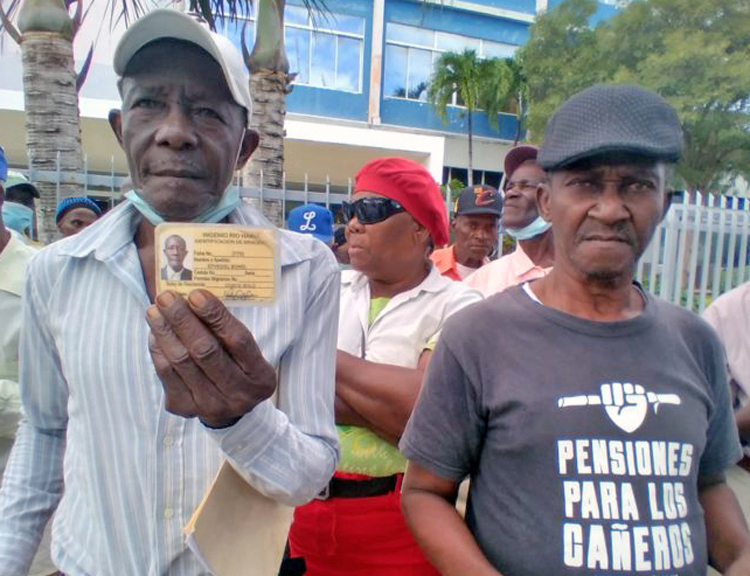The government of President Luis Abinader in the Dominican Republic has stepped up deportations of Haitian immigrants and Dominican citizens of Haitian descent. This takes place as the May 2024 presidential election is approaching.
Abinader’s campaign aims to rally support by fanning anti-Haitian bigotry. And it follows calls by foreign and native investors alike to squeeze more productivity from workers and more “tax exemptions” from the government.
The Dominican rulers are exploiting the deep economic, political and social crisis in Haiti to fan reactionary Dominican nationalist sentiments. They hope to use these divisions to mask their profit-driven attacks on wages, working conditions and government social programs.
The continuing influx of Haitian immigrants creates “a process in which we’re losing our nationality and overloading essential public services,” Abinader told the Dominican congress in February.
Other politicians have joined in this attack. The Haitian influx will provoke “a stampede of Dominicans going abroad, and the fate of the [Dominican] territory and its inhabitants would be left in hands of Haitian immigrants that would not take long in turning it into a copy of what already exists in their country,” Eduardo García Michel, an academic who has served in the government, wrote in a Propuesta Digital editorial in March.
In September the Abinader administration closed down the border and cut off all trade with Haiti, in response to the Haitian government’s plan to build a canal to draw water from the shared Massacre River that separates the two countries. The Dominican rulers seek to maintain their dominance over the water supply at the expense of farmers in Haiti.
The Dominican government has deported over 113,000 ethnic Haitians in 2022, including pregnant women and unaccompanied minors. And it’s on pace to surpass that figure this year. Many of those deported were born and raised in the Dominican Republic, but were stripped of their citizenship in 2013 when a court ruling eliminated birthright-citizenship for more than 200,000 Dominicans whose Haitian-born parents had been undocumented.
These attacks have deepened the pariah status and exploitation of Haitian migrants, denying them political rights as well as access to schools, government-funded medical care and other basic services.
“Dominicans and Haitians who live in the sugar plantations get along well,” Ive Cahio told Militant reporters during their recent visit to sugarcane communities in the Dominican Republic. Cahio is a Haitian sugarcane worker who has been active in the fight led by the Sugarcane Workers Union (UTC) for retirement pensions for thousands of Haitian and Dominican workers.
“The problem is when you go to government offices or a hospital and they don’t treat you properly,” he said, referring to the discrimination Haitians have to endure.
Migrant workers — and Dominicans — without medical insurance have to pay thousands of pesos out of pocket just to see a doctor. In the meantime, Haitians are blamed for the crumbling public health services, which are grossly underfunded to begin with.
A trap for the labor movement
Leaders of the country’s main trade union federations have joined government officials and bourgeois politicians in pushing the false illusion that for Dominican-born workers to have decent wages and living conditions, immigrants must be denied.
Félix Martínez, national secretary of Sinatracom, the construction union, argues that the competition with Haitian immigrants forces Dominican workers to face low wages and bad conditions, leading them to leave the country. But rather than organizing Dominican and Haitian workers to fight together against the bosses for better conditions, Martínez and other union officials back the government enforcing limits on migrant labor.
By law, 80% of the workers in every company must be Dominican. But this isn’t implemented in many cases, including in construction, sugarcane and other agricultural production, which have an overwhelmingly Haitian labor force. Large numbers of Haitians also work in the hotel industry, doing housekeeping, maintenance, landscaping and other jobs, including tourist services. Many Haitian migrants speak three languages — Spanish, French and English.
Real improvements of conditions for workers — national and foreign born, male or female, Black and white — can only come from struggles waged by our class through the unions, not only for better wages and conditions, but also for government-funded health care, education and other social gains.
Poison of anti-Haitian prejudice
Haitians and Dominicans of Haitian descent have faced discrimination over generations and the Dominican ruling class has used mass deportations and even harsher attacks at different times to break down the solidarity that exists between the two peoples.
Under the dictatorship of Rafael Trujillo, who ruled the country with an iron fist from 1930-61, he promoted the “vision” of a Dominican Republic that was Spanish, Catholic and light skinned. He counterposed this to racial stereotypes portraying Haitians as “inferior,” whose darker skin, Creole language and different religious practices were a threat.
In 1937, Trujillo ordered the army to kill all “Haitians” living in the northwestern border by the Dajabón River. Over 20,000 were slaughtered.
To combat the deep divisions fostered by the ruling class, a conscious vanguard of the working class in the Dominican Republic will need to be built to lead a political fight against national oppression as part of a struggle to take state power from the capitalist and landowning exploiters.


